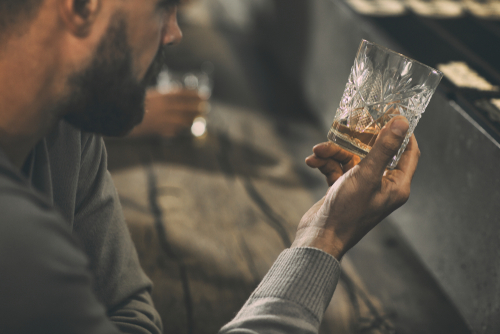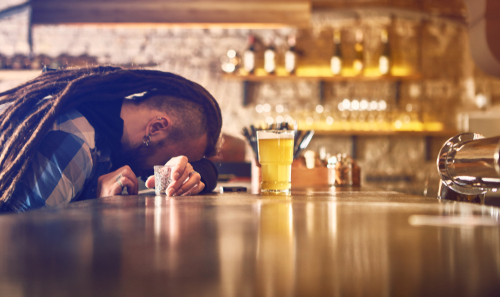Can Alcoholics Drink In Moderation?
Yes, some individuals with an alcohol use disorder are able to moderate their drinking. But this method requires some planning and dedication, hence the name “moderation management.” It’s possible to slowly cut back on how many drinks you have a week, lowering the number day by day. But this is in the hands of the individual. If an alcoholic becomes more lenient with their drinking levels, and three drinks a week turns into three drinks a day, the original moderation plan may have been an unwise choice.
Complete abstinence has been supported by Alcoholics Anonymous and most addiction centers, but new trends like “California Sobriety*” have confused recovering alcoholics. They’re unsure if “just one drink” is black-and-white thinking or the only warning they need. It’s all about self-control, and most addiction specialists agree that moderation management is most successful for individuals who are problem drinkers but do not meet the criteria and have not been diagnosed with moderate or severe alcohol dependence.
*California Sobriety has been labeled as abstaining from “hard drugs” like heroin, meth, or cocaine, while still consuming cannabis, psilocybin mushrooms, and in some cases, alcohol.

Does Everyone With A Drinking Problem Need To Go To Rehab?
If you’re not physically dependent on alcohol and can quit or lower your alcohol consumption, you probably don’t need addiction treatment. But this can have a flip side. Most alcohol treatment programs are primarily intended for individuals with severe drinking problems. As a result, people with milder issues don’t want to look into addiction treatment. They probably don’t want to be labeled “alcoholics,” attend Alcoholics Anonymous (AA) meetings, or commit to complete abstinence. This could cause them to ignore unhealthy drinking habits, eventually leading to an addiction they won’t acknowledge.
How To Identify An Alcohol Use Disorder
An alcohol use disorder (AUD) isn’t the same as problem drinking, binge drinking, or heavy drinking. Individuals are only diagnosed with an alcohol use disorder if they’re physically and emotionally dependent on alcohol, similar to nicotine and drug addictions. While the amount of alcohol consumed may vary among individuals, they all have a physical craving for alcohol that never completely disappears.
Some people aren’t the best individuals after drinking and can become emotional, angry, or verbally abusive. They could be obnoxious or make rash decisions when they’re inebriated, but if they’re not dependent on alcohol and don’t have withdrawal symptoms after a day of not drinking, they probably don’t have AUD. However, uncontrolled drinking can turn into AUD, especially when alcohol becomes a coping mechanism for stress, anxiety, or depression. Ask yourself these questions and see if any resonate with you.
- Do you drink despite it causing feelings of depression, anxiety, or worsening other health issues?
- Have there been instances where you ended up consuming far more alcohol than you originally intended?
- Since you started drinking, have you lost interest in activities and hobbies that used to bring you joy?
- Have you experienced symptoms associated with alcohol withdrawal? (Restlessness, sweating, vomiting, nausea, etc.)
- Do you often experience strong urges or cravings to drink alcohol?
- Have you found yourself in situations while drinking that put you at a higher risk of harming yourself or others, such as drinking and driving?
- Have you encountered legal issues as a result of alcohol-related problems?

Tips If You Try Moderation Management
Before you try moderation management, talk to a professional therapist or addiction specialist. Even if you’re certain you don’t need substance abuse treatment, getting a professional opinion can help narrow down your options and reveal any unnoticed drinking patterns. In the meantime, here are some incredibly useful tips before you try moderate drinking.
- Keep track of your alcohol intake: Consider using a physical card or smartphone app to monitor and track how much you’re drinking. Be mindful of standard drink sizes (e.g., 12 ounces of regular beer, 5 ounces of wine, or 1.5 ounces of distilled spirits). While it’s easier to track at home, you can also communicate your goals to your friends or family in social settings when there’s drinking involved.
- Set realistic goals: Some people can jump right into moderation and struggle to stick to suddenly controlled drinking. Start by designating certain days as no-drinking days. Decide in advance which days are acceptable for having a drink and which days you will abstain. And when those days come up, stick to your plan and avoid situations where you could be enticed.
- Explore medication options: Talk to a professional detox program and ask about medications for alcohol use disorders and withdrawal symptoms. Medications like naltrexone (Revia, Depade, or Vivitrol) can help you learn moderation by blocking the pleasurable effects of alcohol and reducing cravings when consistently taken each time you drink.
Cons of Moderation Management
Moderation management isn’t without its cons, and if you don’t want to risk drawbacks or relapse, complete abstinence is probably the better route. Here are a few reasons why moderate drinking may not be effective for everyone:
- You could go through withdrawal symptoms: If you cut back on alcoholic beverages and notice withdrawal symptoms, chances are your body has a physical alcohol dependence. This doesn’t mean you can’t try moderate drinking, but it’s better to talk to a professional detox and addiction program where you can avoid physical and psychological discomfort.
- You might forget the negative consequences: There is a tendency to quickly forget the negative effects of drinking, such as hangovers, blackouts, upset stomachs, and regret. One drink can turn into ten before an individual realizes their old drinking behaviors have taken over.
- You could start to lose control: If you can’t manage the amount of alcohol you allotted for a specific day, you could relapse, and once this cycle starts again, it’ll take another round of effort to cut back. By this time, it’s probably best to quit drinking altogether.
Read more: Lapse Vs Relapse: Differences, Stages, & Prevention

Healthy Alternatives To Drinking Alcohol
Moderate drinking and quitting completely quitting can be difficult, especially if you aren’t sure how to spend moments where you were usually drinking. Try these healthy alternatives to fill the time and work on other skills.
- Discover new hobbies: One of the benefits of moderating alcohol use is the opportunity to replace drinking or alcohol-related activities with fun and fulfilling hobbies. This exploration can help you identify triggers that prompt you to drink, such as specific social situations, work-related stress, or boredom.
- Prepare your “no” response: Moderating your alcohol consumption may involve declining drinks on occasion. Planning and practicing a polite and assertive way to refuse offers can make it easier to stick to your decision and avoid uncomfortable excuses.
- Discuss and manage urges: Engage in self-reflection or have conversations with trusted individuals, such as friends, family members, or healthcare professionals, to openly address and understand your urges. Remind yourself why you chose to moderate your drinking and explore healthy distractions to navigate through these moments.
- Substitute alcoholic beverages: Instead of consuming alcohol, plan and explore non-alcoholic beverage options. Enjoyable alternatives include soda with fresh lime juice, virgin mojitos, soda infused with fruits, kombucha, or mocktails.
- Explore relaxation techniques: If you previously used alcohol to relax, consider adopting healthier strategies to unwind. Various techniques can help, such as deep breathing exercises, engaging in physical activity, practicing meditation, mindfulness, progressive muscle relaxation, spending time in nature, or participating in yoga sessions.

Contact East Coast Recovery For Alcohol Addiction Treatment
If you or someone you know is struggling with alcohol recovery, contact East Coast Recovery in Boston, Massachusetts. At our addiction treatment center, we don’t see our clients as problems to solve but as individuals who have their own needs, wants, and goals. We focus on healing the entire person through various evidence-based therapy methods and holistic healing modalities. Many of our staff and admissions team are also in recovery and are dedicated to helping individuals find the same path to wellness.











